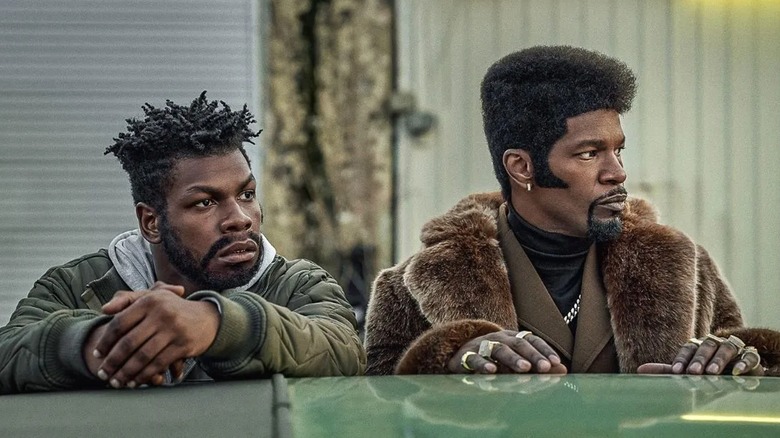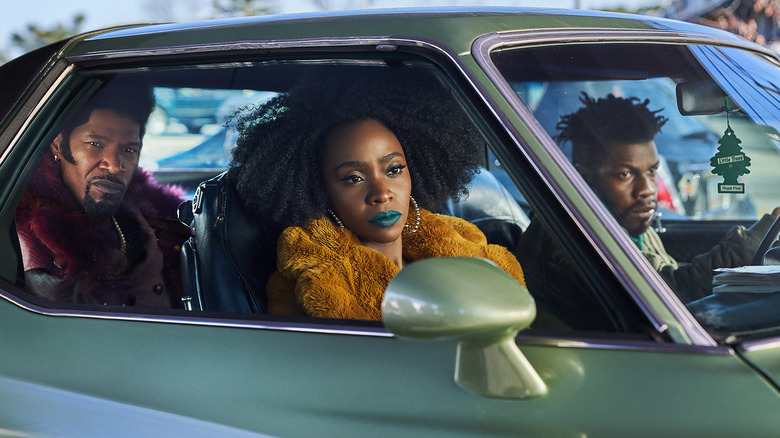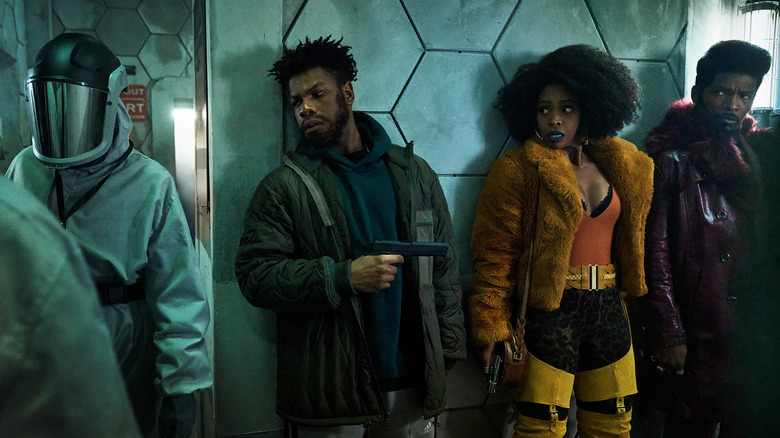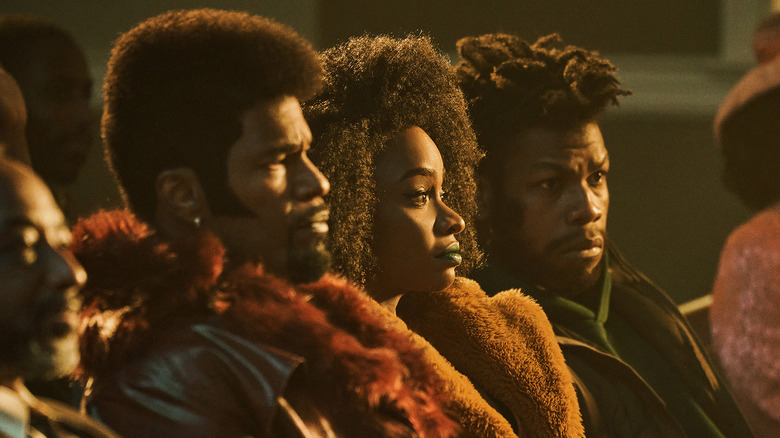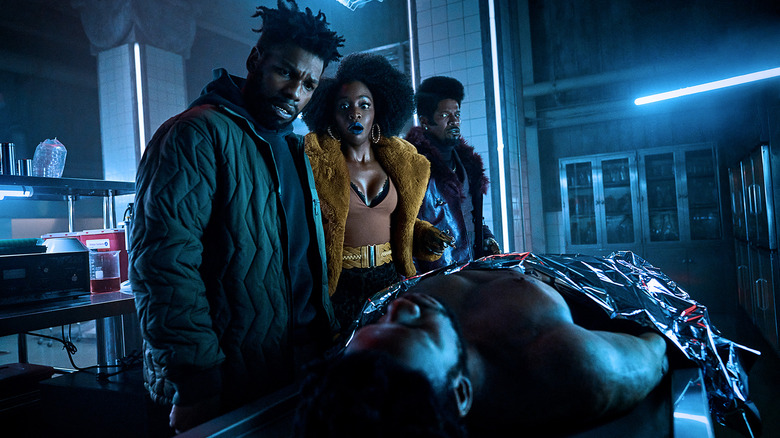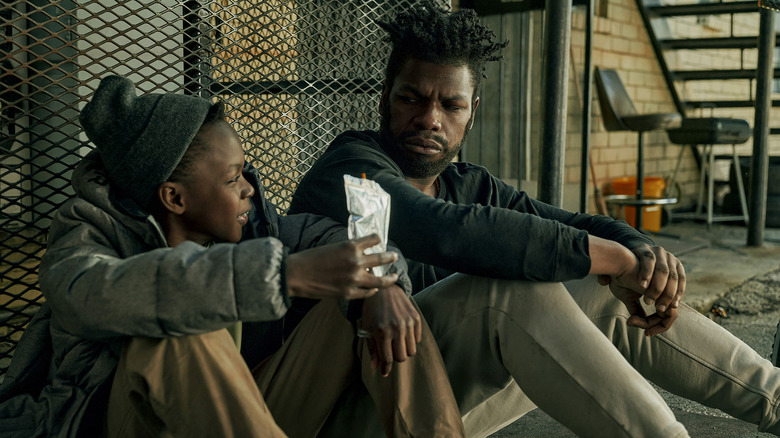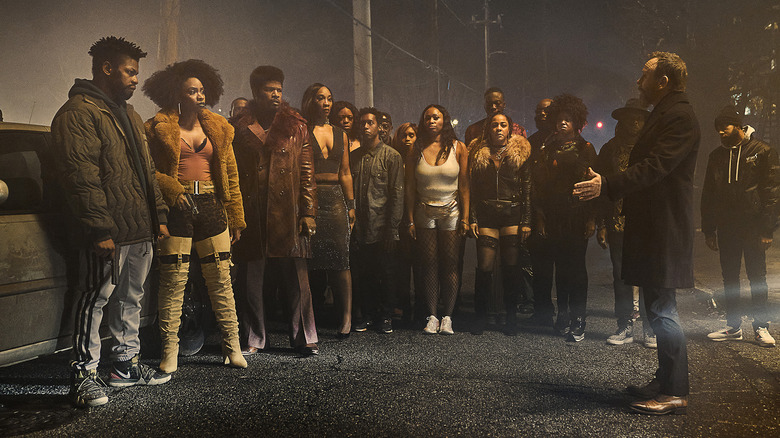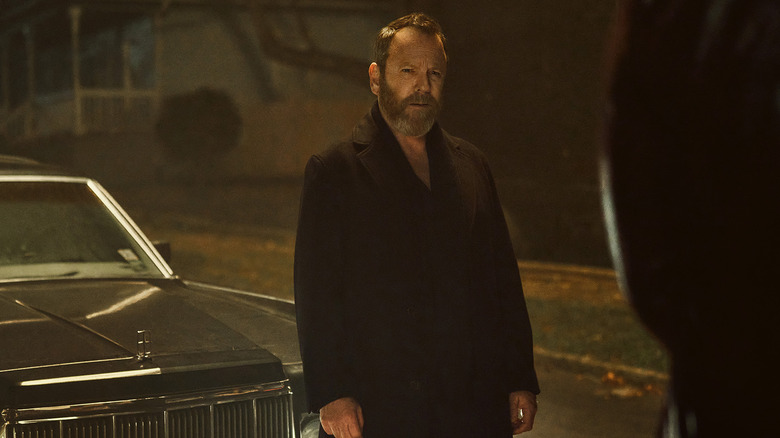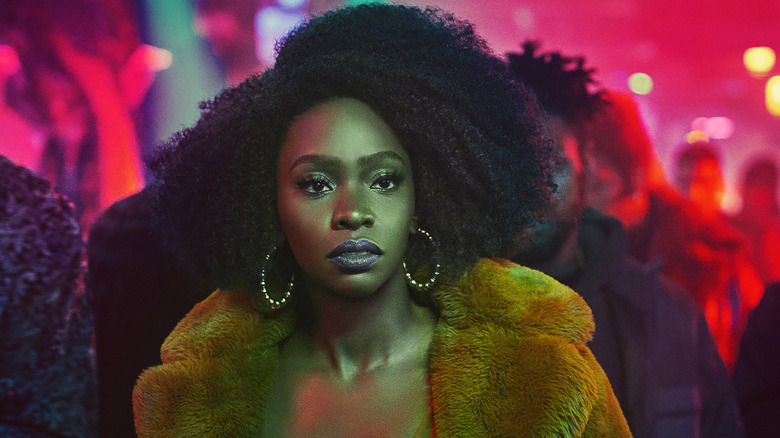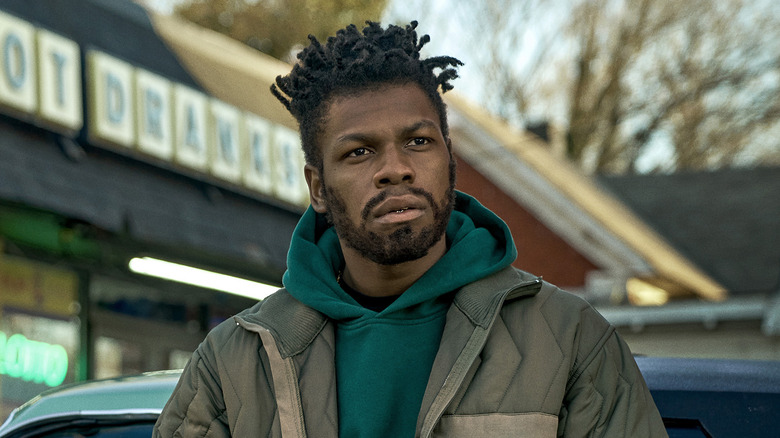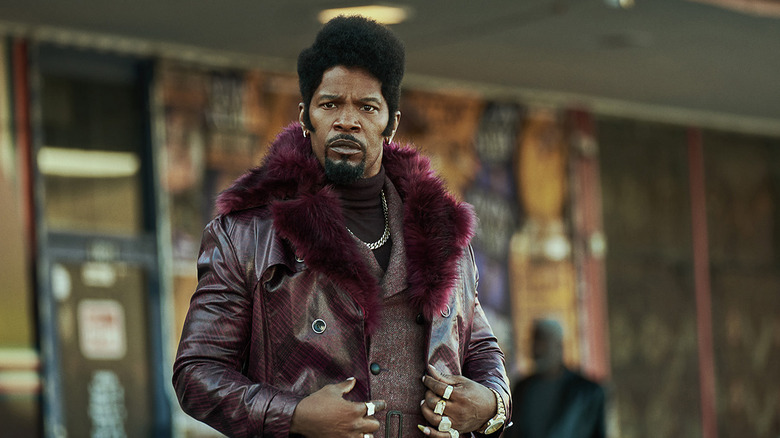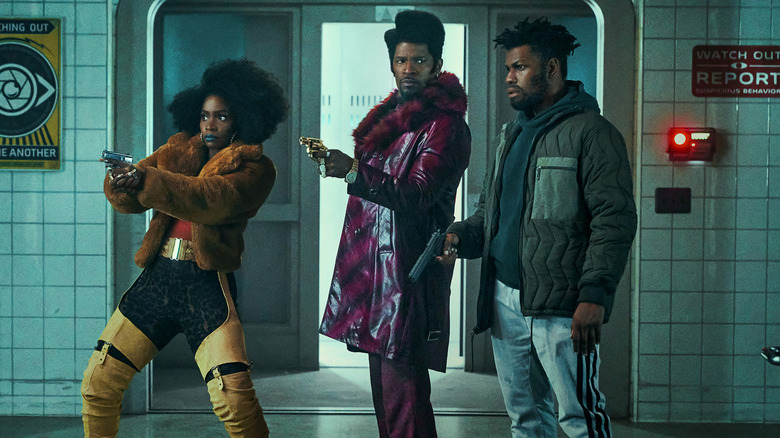The Ending Of They Cloned Tyrone Explained
This article contains spoilers for "They Cloned Tyrone."
The genre-bending film "They Cloned Tyrone" leaves a lot for audiences to ponder and dissect. This homage to Blaxploitation films could be considered a cousin of Jordan Peele's 2017 debut, "Get Out." Though they diverge greatly, they both deal with the metaphor of white people attempting to hijack and control the bodies of unwilling Black people.
An unlikely group of heroes, Tyrone Fontaine (John Boyega), Slick Charles (Jamie Foxx), and Yo-Yo (Teyonah Parris), uncover a government operation that has been cloning Black people in low-income neighborhoods in major cities all over America. The goal is to eventually phase out Black Americans over the course of several generations. They've been doing this by drugging products and putting them in Black communities while at the same time kidnapping people for experimentation.
The bootleg Scooby-Doo gang manages to stop these horrifying experiments, but not before some discover they are clones themselves. From the honesty about America's violent history to the satirical representation of topical race issues, "They Cloned Tyrone" has plenty to unpack. First time director Juel Taylor weaves a world worth exploring, so let's get into it, from The Glen to Olympia Black.
What you need to remember about the plot of They Cloned Tyrone
Tyrone Fontaine is a drug dealer in a bleak neighborhood known as The Glen. Having lost his little brother to street violence, he mostly goes about his days indifferently. After angering Isaac, a rival drug dealer, he visits local pimp Slick Charles to collect money owed to him. As he's leaving, Tyrone is shot several times in the chest and left to die in a motel parking lot.
He wakes up in his home the next day with no memory of what happened. Charles and Yo-Yo, a sex worker, confirm that they witnessed his murder, but he still doesn't believe it. While looking for the man who supposedly murdered him the night before, the trio investigates an abandoned house where Isaac's car is parked. Once inside the house, they find a very out-of-place, high-tech elevator and take it down to discover an unbelievable subterranean laboratory full of horrors. The worst discovery is when Tyrone finds his bullet-riddled body in a body bag on a slab.
Once back above ground, Yo-Yo, a fan of Nancy Drew mysteries, comes to the conclusion that Tyrone is a clone and the government is secretly doing experiments on Black people.
What happened at the end of They Cloned Tyrone?
The group finds another secret elevator inside a church. Wearing hazmat-type suits to hide their identities, they investigate the facility and learn that a drug is being placed in products like hair relaxer, fried chicken, and grape juice sold in predominantly Black neighborhoods across America. The drug makes anyone who takes it more accepting of whatever adversity they encounter. (This could be a reference to the real-life theory that the CIA flooded Black communities with crack cocaine.)
Tyrone comes face to face with the Lead Geneticist of the operation, who just so happens to be the original, much older Tyrone Fontaine. The big plan is to gradually phase out the Black population by cloning them over generations, slowly altering their DNA to make them white. Using quick thinking, our Tyrone manages to kill the aged Tyrone.
With the help of some gang members, the heroes overthrow the evil laboratory. The clones and captives are freed, and the tainted products destroyed. This doesn't go unnoticed, as local news stations broadcast the sudden appearance of naked individuals wandering the streets.
Yo-Yo, Slick Charles, and Tyrone agree to leave The Glen to find a better life and to try and uncover other operations happening in other cities. During a mid-credit scene, we are introduced to Los Angeles Tyrone, watching a similar newscast about other unidentified naked Black people wandering the streets. He and his friends are startled to see "him" among those confused people.
What does the end of They Cloned Tyrone mean?
It's never explicitly revealed who is at the top of this entire operation. Writer-director Juel Taylor told USA Today, "It's intentionally vague who started the secret program." The elderly OG Tyrone Fontaine is the Lead Geneticist who made the science happen. When he explains to the cloned Tyrone how this sinister operation came to be, he offers a simple explanation: "Assimilation is better than annihilation." Indeed he is referencing America's centuries-long attempt to annihilate the Global Majority. The new plan to rid the U.S. of the Black population is to eventually turn them white. But while they wait for the transformations, they will settle for mind control, all under the guise of keeping peace in America.
The passageways to the underground lab are strategically hidden in establishments designed to appeal to predominantly Black neighborhoods, including Baptist churches, fried chicken restaurants, liquor stores, and strip clubs. Sociologically, one can argue that these places exist in these neighborhoods to keep Black people distracted from what we should be focusing on.
The clones are a metaphor for how white America only accepts Black people and Black culture when it makes them money or puts them at ease, while maintaining the power imbalance by intentionally keeping Black people oppressed.
Will the real Tyrone Fontaine please stand up?
When Tyrone is shot and killed early in the film and then wakes up with no memory of the incident, the characters (and likely the audience) assume that we are just meeting Tyrone number 2. It soon comes to light that there have been many versions of Tyrone along the way. At the end of the film, the original Tyrone is introduced as the Lead Geneticist who improved the formula to make the cloning possible. We can surmise that this project has been going on for years because he is now an elderly and bitter man.
Losing his little brother Ronnie to gun violence is the reason he made this deal with the devil. The thought plagues OG Tyrone that gun violence is such a significant problem to the Black population that through this process, he can save lives by making them more passive.
Where is The Glen?
"They Cloned Tyrone" is set in a city called The Glen. It could be loosely based on The Glen, located in San Antonio, TX, but that's never specified. More than likely, its vague location is on purpose. It's a low-income neighborhood plagued with rundown abandoned buildings and a liquor store on every block. Areas like this exist in just about every major city, and at least three U.S. neighborhoods are known as The Glen, located in New York, Texas, and Illinois.
Location isn't the only vague identifier. The time is questionable as well. The film is shot with a gritty look that slides you directly into a 1970s Blaxploitation film. There are even cigarette burns every so often in the top right corner, imitating the look of projected film. The cars look like they've been driven off a vintage lot, while the clothes look directly from a futuristic runway.
Keeping the time period and geographical location vague helps the audience lose themselves in the conspiracy as it unfolds. It makes it more believable that this could happen anywhere as you realize it's happening everywhere. The government may have started cloning neighborhoods before they decided to clone people.
The message in the music
In "They Cloned Tyrone," the allusive "They" responsible for drugging truckloads of products going into Black communities also dabble in music production. When the movie opens, a man outside a convenience store is selling bootleg CDs by an artist named Ruckus. Several times throughout the film, this Hip Hop artist can be heard playing on radios. The significance of this fictitious artist becomes clear at a principal moment in the film.
The mystery-solving trio has just escaped from their second venture into the underground lab when they exit through a secret door that leads them into a strip club. The white DJ with an afro is notified that the security has been breached and he needs to "intercept and subdue." This is accomplished by playing a Ruckus track labeled "Play In Case of Emergency." The lyrics are just the words "round and round" on a loop, but it hypnotizes the club patrons, rendering their minds more pliable for control.
Since the 1980s, Hip Hop and Rap music have frequently been blamed for the corruption of youth, and Ruckus is the representation of these complaints. When we meet the L.A. Tyrone, another Ruckus song is played. With lyrics like, "You are enslaved/Do what I say," obviously this song is much less subtle with the messaging.
Who is Olympia Black?
Tyrone, Yo-Yo, and Slick Charles are chased out of the strip club by an angry mob of mind-controlled patrons. They make it to their car, when the crowd abruptly stops and just stands there. The trio gets out of the car to see another car pull up. Out steps a more clean-cut, well-dressed Tyrone clone named Chester, accompanied by a man named Nixon (Kiefer Sutherland).
Nixon describes himself as "mall security" — he is not the man in charge, but he holds some authority. Ready to end this, Tyrone pulls a gun on Nixon. Nixon says, "Olympia Black," giving him the power to manipulate both Tyrone and Sick Charles. "Olympia Black," as it turns out, is the code phrase used to control all clones.
Who is Olympia Black, and what does she have to do with any of this? There is a real-life Olympia Black, a Science Fiction author who writes stories about humanity's relationship with aliens and artificial intelligence. By definition, the clones are neither aliens nor AI, but they're not far from it. One can imagine that somewhere along the way, one of the people in charge of these operations read a few of Black's short stories and saw the work that was being done as mere observations of the human condition.
In reality, the name was chosen because "It just rolled off the tongue," Juel Taylor told USA Today. "There's a lot of like Easter eggs buried in the movie, and ironically, this is not one of them."
The hair is stubborn
Quite a few of the foot soldiers in "They Cloned Tyrone" have a unique quality. They're all men presenting as white, but with the textured hair of a Black person — the workers in the lab, the fried chicken restaurant employees, the strip DJ, and more. OG Tyrone mentions this as a side effect of the imperfect gene sequence, calling the hair "stubborn."
One product containing the mind control drug is a chemical hair relaxer some Black women use to straighten their hair. While Yo-Yo is captured and used as a test subject, the relaxer is slathered on her hair. She passes out, so the lab workers leave her unattended. Once alone, she pulls off her wig to reveal that her natural hair is in braids, also known as a protective hairstyle, which literally protects her from harm.
All of these can be seen as the many ways white America has tried to make Black people feel that our natural hair is an imperfection. From the Tignon Laws to the Crown Act, our hair has been a topic of discrimination for decades.
A most impressive identity crisis
Another meaning behind "They Cloned Tyrone" is that the clones represent an identity crisis. When Tyrone and Slick Charles realize they're both clones, they begin having an existential crisis. Slick Charles has been quite proud that he was the 1995 International Player's Ball Pimp of the Year. Even though this version of himself remembers it happening, he knows now that it didn't actually happen to him.
Tyrone responds similarly after seeing his dead body and several other versions of himself in pods in the underground laboratory. OG Tyrone has made sure to keep the heavy grief of losing his little brother in each Tyrone clone. Though he struggles to accept that he's not an original, Tyrone concludes that he wants to live and see the world. Of course, he has to quite literally fight himself (in the form of another clone, Clarence) to be free. Clone or no clone, many people can relate to this feeling of trying to find yourself.
Does They Cloned Tyrone challenge ethics in medicine?
"They Cloned Tyrone" gives much commentary to many of the ways Black Americans have been and continue to be mistreated, demonized, and made to feel disposable. During a confrontation, Nixon explains that they chose this neighborhood and others like it because it can be kept in squalor, and their tortures can go undisturbed. As long as there is no Starbucks in the vicinity, they're safe from gentrification, and no one will care about what happens there. They clone the drug dealers and gang members specifically so that they can keep up appearances. As OG Tyrone Fontaine explains, the goal is to eventually phase out the Black race.
These types of ideas can be found in American history with the "father of modern gynecology," James Marion Sims (via History). Sims developed tools and surgical practices related to women's reproductive health by experimenting on an enslaved Black woman named Anarcha. This 17-year-old woman endured 30 operations without anesthesia or having given consent. As you can tell from his moniker, the medical field valued his contributions even though they came at such a high price for Anarcha.
From 1932 to 1972, there was the Tuskegee syphilis experiment, which was described as a study to record the natural history of syphilis. The experiment involved 600 Black men who were lied to and infected with untreated syphilis. These are just two examples of the unethical treatment of Black people in the name of science.
Can they clone They Cloned Tyrone?
"They Cloned Tyrone" tells a complete and captivating story, but seeing more of that story would be fun. Once all the clones and captives are freed, Tyrone, Slick Charles, and Yo-Yo plan to move to Memphis. Originally Yo-Yo wanted to move there to better herself. Now, knowing the truth of their existence, the two men want to join her. They want a change, but they're also looking forward to perhaps uncovering more of these underground operations happening in other cities.
We know it's already happening from the mid-credits scene, which shows an L.A. Tyrone watching a newscast of a different city with more recently released clones. When asked about a sequel, Juel Taylor told USA Today that it's unlikely we'll get a continuation of the story. "I wouldn't say zero percent chance. Me and [producer and writer] Tony Rettenmaier always joked that if we did a sequel, it would just be like the three of them trying to start a pizza shop. Just a totally different genre with no explanation."
